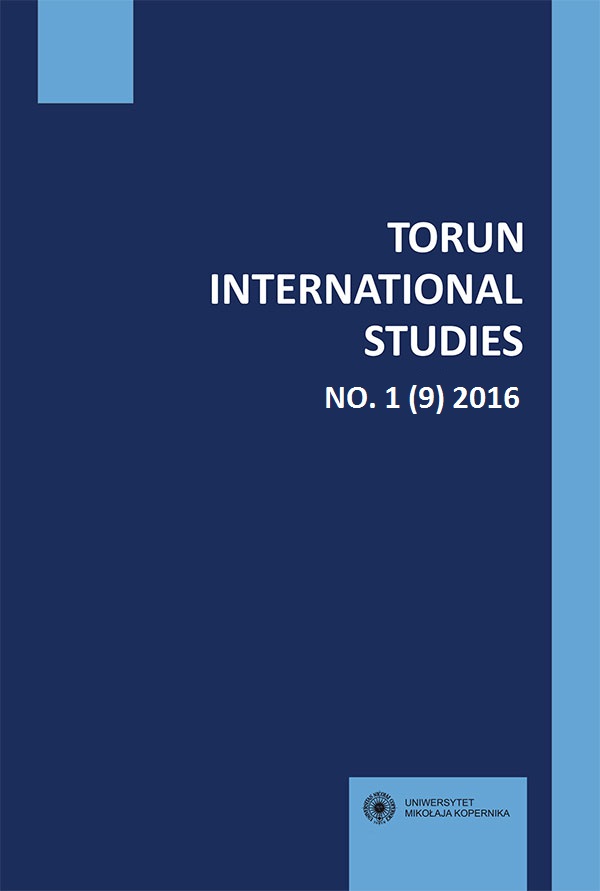INTERNATIONAL RATING AS A CREDITWORTHINESS MEASURE OF A STATE
DOI:
https://doi.org/10.12775/TIS.2016.010Keywords
credit rating agencies, “Big Three”, international rating, rating, the European Rating PlatformAbstract
Credit rating agencies play an important role in the world due to the fact that rating has become a reliable indicator of the evaluation of a debt investment. A reliable agency that is globally recognised ought to be independent, objective, professional, ethical and substantive. Rating itself constitutes an opinion that concerns the possibility of servicing of payment obligations made by a given entity. It is also frequently defined as an independent and objective evaluation of credit risk of a given entity wishing to contract a debt. Rating is a dynamic category concerning the future, therefore each forecast is surrounded by uncertainty. Ratings of individual agencies may differ considerably. The aim of the article is to discuss the role of international rating as a credibility measure of a state, the role of credit rating agencies, of the rules of rating and of the level of rating for the countries of the European Union, especially given the fact that rating for a country is reflected in its credibility and attractiveness.References
Ammer, J.M. & Packer, F. (2000, June). How Consistent Are Credit Ratings? A Geographic and Sectorial Analysis of Default Risk, FRB International Finance Discussion Paper, No 668 Washington DC, Board of Governoms of the Federal Reserve System. Retrieved 28 December 2016, from http://www.ssrn.com/abstract=232909/
Boot, A.W.A., Tood, T.M. & Schmeits, A. (2006). Credit Ratings as Coordination Mechanisms. Review of Financial Studies, (vol. 19(1)).
Brylak, J. (2011). Agencje ratingowe na rynku inwestycji. Prawne aspekty instytucji. PTE, Scientific Journals, (11).
Cantor, R. & Packer, F. (1996). Determinants and Impact of Sovereign Credit Ratings. FRNBY Economic Policy Review.
Chądzyński, M. (2016, May). Jak wielka trójka agencji ratingowych decyduje o wiarygodności i wpływa na rynki. Retrieved 28 December 2016, from http://www.gazeta.prawna.pl/
Ciak, J. (2011). Rating państwa jako metoda oceny zdolności kraju do spłaty zobowiązań w obliczu kryzysu finansowego. Journal Annals WSB, (10(10)).
Dziawgo, D. (1998). Credit – rating. Ryzyko i obligacje na międzynarodowym rynku finansowym. Warszawa: Wydawnictwo Naukowe PWN.
e-gospodarka,pl. (2010, May 12). Agencje ratingowe straciły zaufanie inwestorów. Retrieved 28 December 2016, from http://www.finanse.egospodarka.pl/
Forsal.pl. (2011, August 9). Lista krajów z ratingiem AAA – oto najbezpieczniejsze państwa świata. Retrieved 28 December 2016, from http://forsal.pl/artykuly/537149,lista_krajow_z_ratingiem_aaa_oto_najbezpieczniejsze_oanstwa_swiata.html
Money.pl. (2016, December 2). Rating Polski bez zmian, perspektywa w górę. S&P podjęła decyzję. Retrieved 28 December 2016, from http://www.money.pl/gospodarka/wiadomosci/artykul/rating-polski,69,0,2211141.html
Redo, M. (2016a). Sustaining government budget deficits as a cause for the cost of public debt service increase in Western European countries in the 1995-2015 period. Torun International Studies, (1 (9)). DOI: http://dx.doi.org/10.12775/TIS.2016.005.
Redo, M. (2016b). Bezpieczeństwo finansów publicznych – wpływ ekspansji fiskalnej na poziom kosztu kapitału w Polsce na tle państw Europy Środkowo-Wschodniej (w druku).
Regulation of the European Parliament and of the Council (EEC) no. 1060/2009 of 16th September, 2009 on credit rating agencies (the Official Journal of the European Union L 2009.302.1 as amended).
Regulation of the European Parliament and of the Council (EU) no. 575/2013 of 26th June, 2013 on the prudential requirements for credit institutions and investment companies changing the regulation (EU) no. 648/2012.
Report of the European Commission for the European Parliament and the Council concerning alternative solutions for external credit ratings, the situation on the credit rating market, competition and management in the area of credit ratings, the situation on the market of ratings of financial instruments resulting from securitization and the possibility of creating a European credit rating agency, the European Commission, Brussels, 19th October, 2016, COM (2016) 664 final.
Siemiątkowski, P. (2015). Uzależnienie finansowe jako zagrożenie bezpieczeństwa ekonomicznego państwa, Toruń: Wydawnictwo Naukowe UMK.
Young, E. M. (1993). The Rating Agency’s Role, [in] Emerging Bond Markets In the Dynamic Asian Economies. Retrieved 28 December 2016, from https://www.esma.europa.eu/supervision/credit-rating-agencies/risk/
Downloads
Published
How to Cite
Issue
Section
Stats
Number of views and downloads: 756
Number of citations: 0



